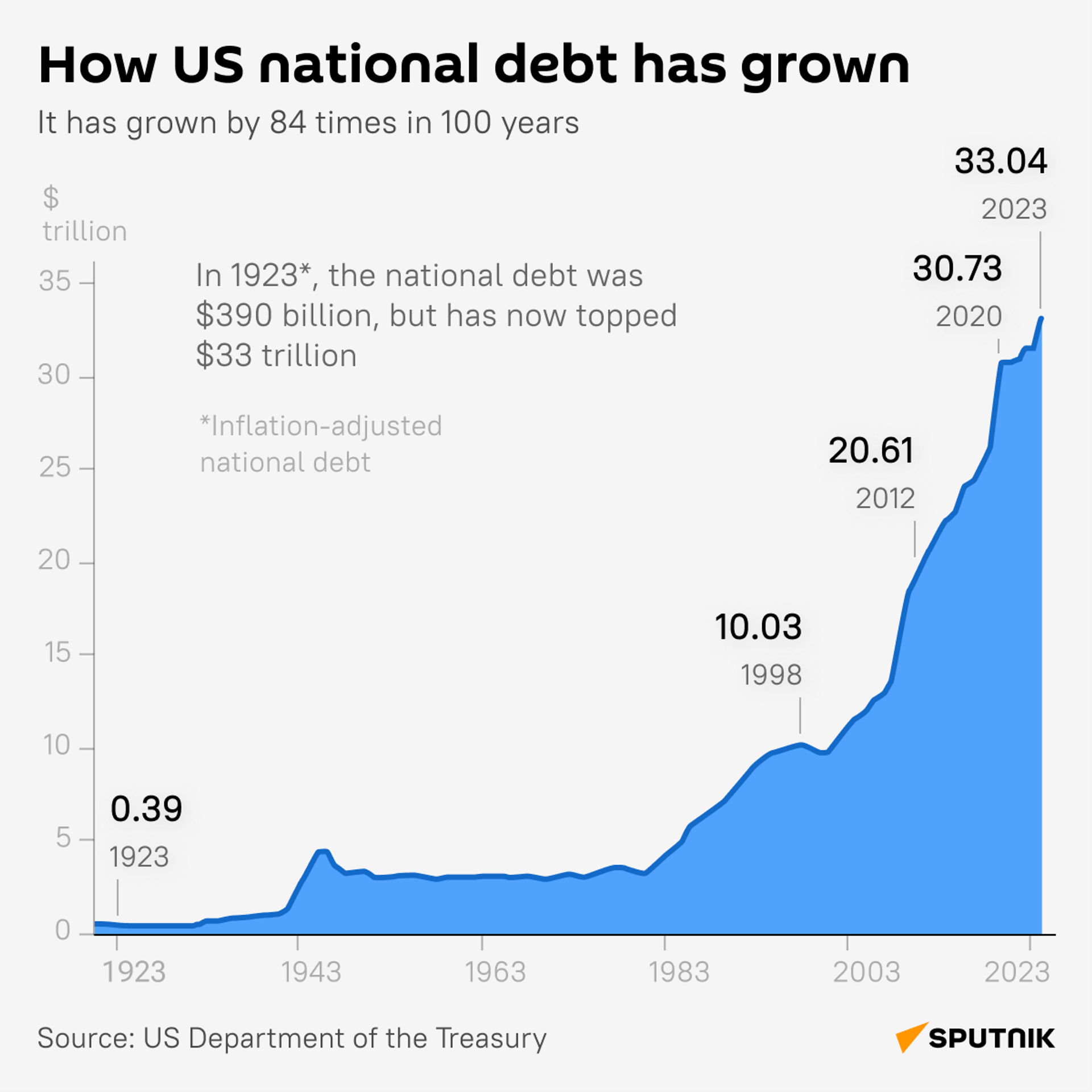https://sputnikglobe.com/20230919/us-national-debt-grew-by-84-times-in-100-years-1113503215.html
US National Debt Grew by 84 Times in 100 Years
US National Debt Grew by 84 Times in 100 Years
Sputnik International
On Monday, the US National Debt rose above $33 trillion, a level 84 times higher than it was a century ago, when the value of the US dollar is adjusted for inflation.
2023-09-19T18:05+0000
2023-09-19T18:05+0000
2023-09-19T18:05+0000
americas
national debt
us
budget deficit
war on terror
world war ii
tax cuts
https://cdn1.img.sputnikglobe.com/img/07e7/09/07/1113167567_0:0:3067:1725_1920x0_80_0_0_e89853800fd66ef364f976d9c0a0a527.jpg
Sputnik's infographics illustrates the precipitous rise of the debt, which includes a mixture of intergovernmental holdings and debt owed to the public via savings bonds, showing how it rose in fits and starts before the 21st century, roughly corresponding to US wars and economic crises.Some of the biggest increases came during World War II, from 1941 to 1945, and from 1983 to the mid-1990s, when taxes were cut amid a massive military buildup against the Soviet Union.However, the most dramatic feature is the sharp spike after 2000, when the US War on Terror, which included the invasion and occupation of Afghanistan beginning in 2001 and Iraq beginning in 2003, accompanied major increases in government spending in the areas of security, intelligence, and healthcare. In the 14 years between 1998 and 2012, the debt grew by $10 trillion, and in the next eight years grew by that amount again, hitting $30 trillion as the COVID-19 pandemic was starting in 2020. Another $3 trillion has been added since, mostly due to Covid-related expenditures and efforts to restart the US economy after the pandemic social shutdowns.The US federal government has never run a budget surplus since 2001 - the results of which can be plainly seen. Now, lifting the debt ceiling and approving more spending bills have become tense political battlefields in Washington, threatening the functioning of the government itself and its ability to service the massive National Debt.
https://sputnikglobe.com/20230825/which-country-owes-the-most-debt-1112859992.html
americas
Sputnik International
feedback@sputniknews.com
+74956456601
MIA „Rossiya Segodnya“
2023
News
en_EN
Sputnik International
feedback@sputniknews.com
+74956456601
MIA „Rossiya Segodnya“
Sputnik International
feedback@sputniknews.com
+74956456601
MIA „Rossiya Segodnya“
us national debt; war on terror; deficit spending; tax cuts; cold war
us national debt; war on terror; deficit spending; tax cuts; cold war
US National Debt Grew by 84 Times in 100 Years
On Monday, the US National Debt rose above $33 trillion, a level 84 times higher than it was a century ago, when the value of the US dollar is adjusted for inflation.
Sputnik's infographics illustrates the precipitous
rise of the debt, which includes a mixture of intergovernmental holdings and debt owed to the public via savings bonds, showing how it rose in fits and starts before the 21st century, roughly corresponding to US wars and economic crises.
Some of the biggest increases came during World War II, from 1941 to 1945, and from 1983 to the mid-1990s, when taxes were cut amid a massive military buildup against the Soviet Union.
However, the most dramatic feature is the sharp spike after 2000, when the US War on Terror, which included the invasion and
occupation of Afghanistan beginning in 2001 and Iraq beginning in 2003, accompanied major increases in government spending in the areas of security, intelligence, and healthcare.
In the 14 years between 1998 and 2012, the debt grew by $10 trillion, and in the next eight years grew by that amount again, hitting $30 trillion as the COVID-19 pandemic was starting in 2020.

25 August 2023, 11:11 GMT
Another $3 trillion has been added since, mostly due to Covid-related expenditures and efforts to restart the US economy after the pandemic social shutdowns.
The US federal government has
never run a budget surplus since 2001 - the results of which can be plainly seen. Now, lifting the debt ceiling and approving more spending bills have become tense political battlefields in Washington, threatening the functioning of the government itself and its ability to service the massive National Debt.




